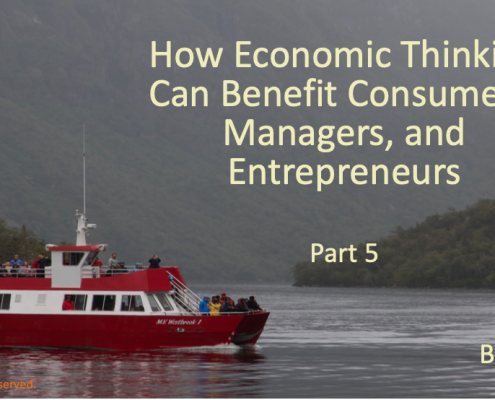Tag Archive for: thinking
 Barry L. Linetsky, 2019
Barry L. Linetsky, 2019How Economic Thinking Can Benefit Consumers, Managers, and Entrepreneurs | Part 7: The Search For A Valid Methodology Of Human Action
/
0 Comments
The term praxeology is used to convey the general scientific study of human behaviour as differentiated from the study of the clockwork deterministic physical scientific world of natural stuff void of consciousness.
 Barry L. Linetsky, 2019
Barry L. Linetsky, 2019How Economic Thinking Can Benefit Consumers, Managers, and Entrepreneurs | Part 6: The Unseen Unintended Consequences of Intended Actions
Henry Hazlitt does an excellent job presenting the importance of recognizing and always taking into consideration the likely unseen and unintended consequences of intended action in the realm of economics in his classic book Economics in One Lesson.
 Barry L. Linetsky, 2019
Barry L. Linetsky, 2019How Economic Thinking Can Benefit Consumers, Managers, and Entrepreneurs | Part 5: Unicorns In Cubicle Farms
Awareness of the Unicorn Problem helps to shine light on why it is that our aspirational good intentions to achieve outstanding results – in politics and in the workplace – so often differ widely from our capabilities and our profound disappointment in the actual results of our collective team efforts.
 Barry L. Linetsky, 2019
Barry L. Linetsky, 2019How Economic Thinking Can Benefit Consumers, Managers, and Entrepreneurs | Part 3: The Economic Way Of Thinking
Mises held that the virtue of economics was its particular capability in providing insight into the link between human values, human action and desired outcomes. He advocated for a distinct economic way of thinking as a valid and necessary extension of logic, and therefore easily available to everybody.
 Barry L. Linetsky, 2019
Barry L. Linetsky, 2019How Economic Thinking Can Benefit Consumers, Managers, and Entrepreneurs | Part 2: Progress Is Not A Foregone Conclusion
An irony of launching ourselves into actions to remove obstacles to our well-being is that often the decisions and actions we take actually lead us in the opposite direction.
